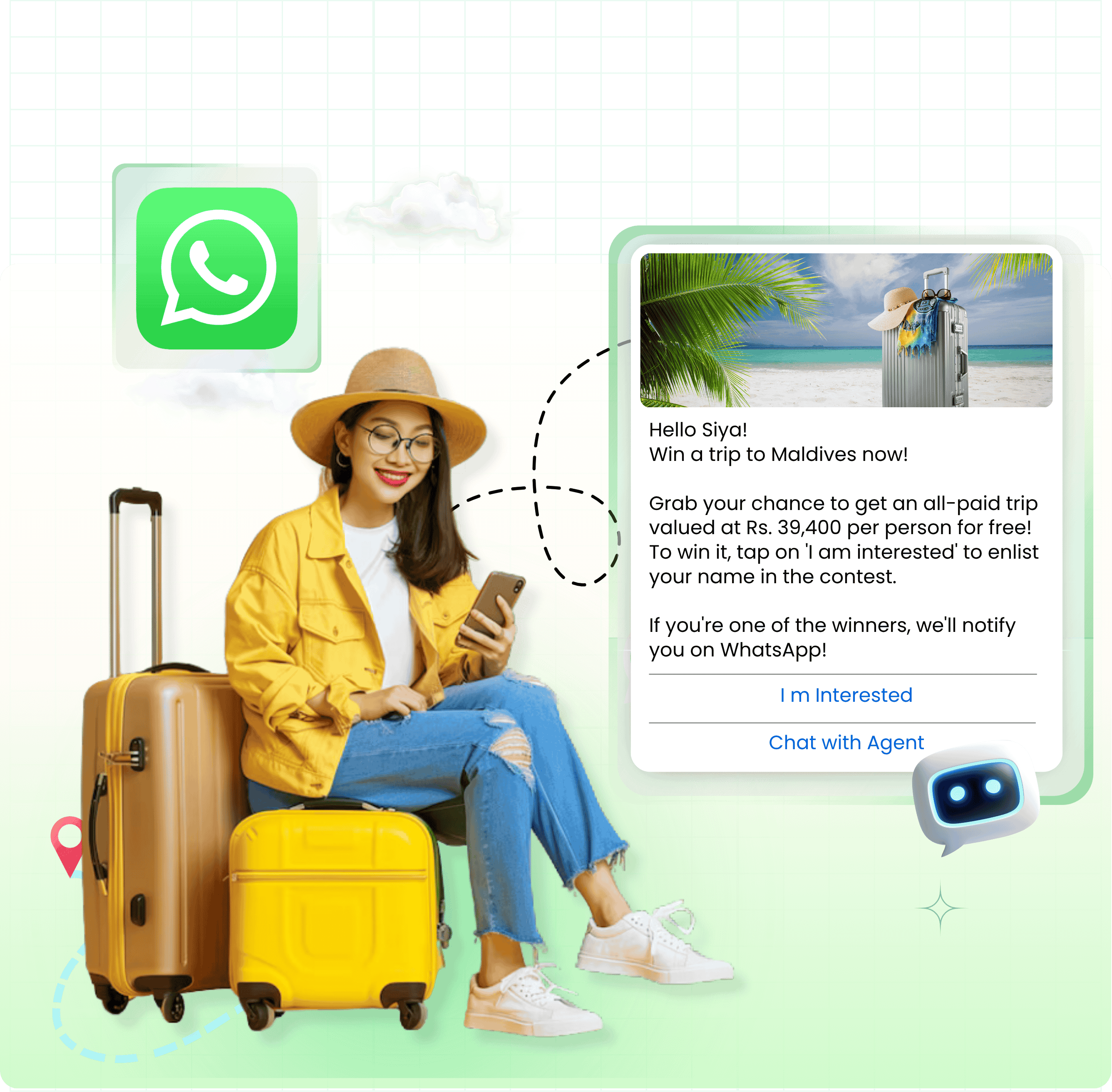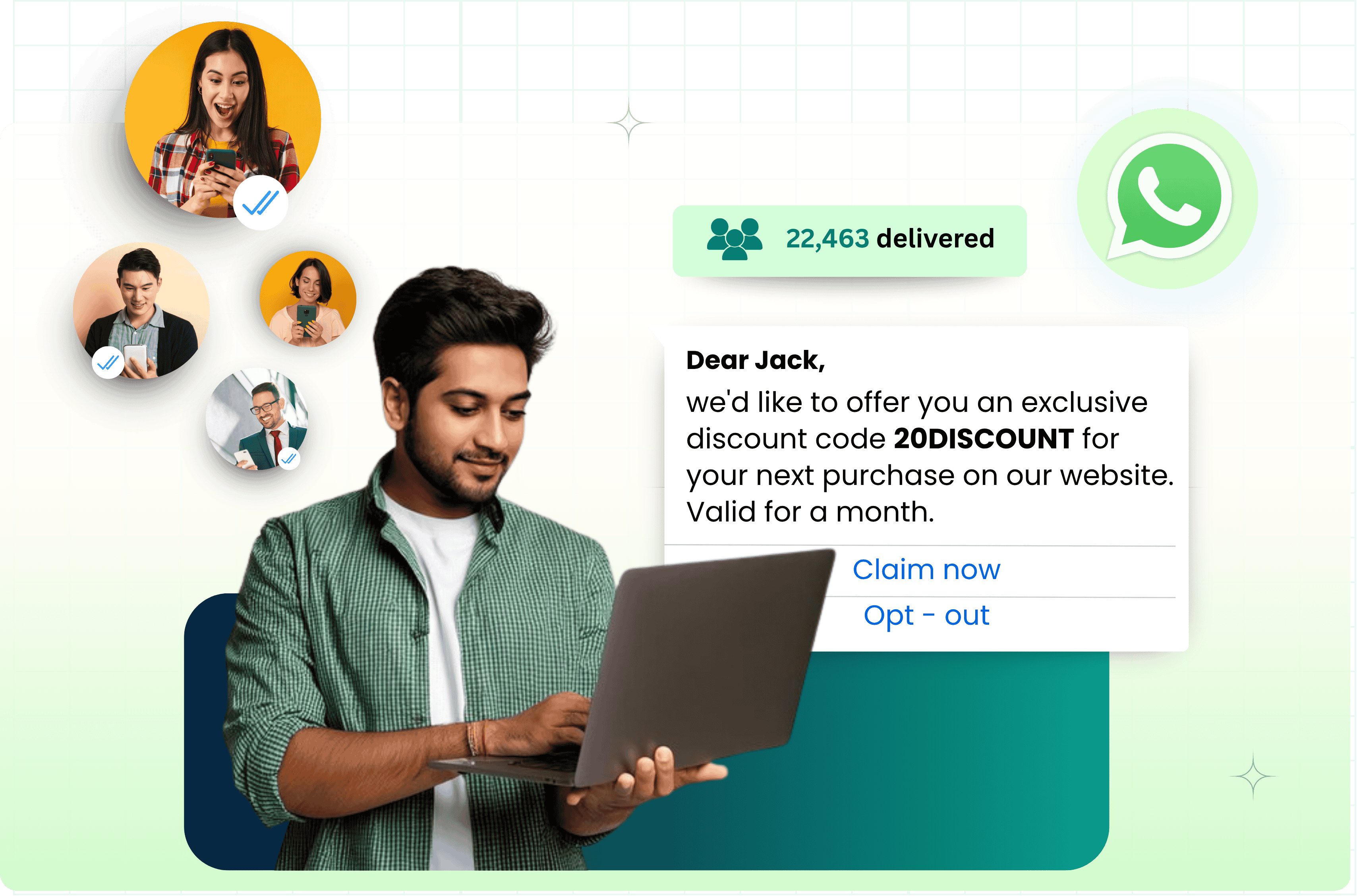Table of Contents:
WhatsApp Business API in 2025: The Complete Guide for Indian Businesses.
Introduction
WhatsApp has grown beyond a simple chat software to become India's largest digital marketplace, customer service center, and even payment channel, with over 500 million active users. If you now operate a business in India, it's likely that your clients are already using WhatsApp. But here’s the problem: most blogs only explain what the WhatsApp Business API — without showing you how to actually use it for growth.
In this guide, we’ll go beyond the basics. This is your one-stop resource on WhatsApp Business API in India (2025).
Let’s understand what is WhatsApp Business API
Meta (formerly Facebook) provides the WhatsApp Business API, a resource that allows medium and large enterprises to connect with their customers on WhatsApp in a scalable, automated, and secure manner.
In contrast to the free WhatsApp Business App (tailored for freelancers and small businesses), the API version:
- There is no graphical user interface, and the application is not downloaded.
- Rather, WhatsApp Api integrates with your existing system.
- Allows you to send mass notifications (such as payment reminders, order updates, and discounts).
- Allows automation and chatbots to generate leads, answer FAQs, and give support.
- Enables UPI transactions, catalog distribution, and processes in WhatsApp
In short, if you’re a small business owner, the WhatsApp Business App works fine. But if you’re an SME or enterprise handling thousands of customers daily, the WhatsApp Business API is your upgrade path.
A clothing boutique with 50 customers/day → use WhatsApp Business App
An online D2C brand with 5,000+ customers/month → needs WhatsApp Business API
What’s New in WhatsApp Business API (2025 Updates)

1. New WhatsApp Pricing Model
Meta has shifted from conversation-based pricing to per-message and per-template billing. Every notification or marketing template now has a cost attached. For SMEs, this means you must design smarter templates that combine multiple updates into one message to keep costs down.
2. WhatsApp AI Agents for Businesses
In 2025, Meta rolled out AI-powered agents within WhatsApp. These intelligent chatbots can:
- Answer FAQs instantly
- Handle order tracking and updates
- Summarize chat history for live agents
- Automate first-level customer support
The magic lies in the AI + human hybrid model. AI agents reduce support costs, while complex cases seamlessly escalate to live staff.
3. UPI Payments on WhatsApp (Big India Update)
India is a mobile-first economy, and payments are the backbone of e-commerce. With NPCI removing onboarding caps, UPI on WhatsApp is now open to all users in India.
This means your customers can:
- Browse your product catalog
- Chat with you
- Pay instantly using UPI inside WhatsApp
No app switching, no payment failures — just faster checkout and higher conversion rates.
4. WhatsApp Flows & Automation
WhatsApp Flows let you create structured customer journeys directly in chat. For example:
- Filling lead forms
- Reordering a past purchase
- Tracking orders
- Resolving disputes
Combined with automation, flows turn WhatsApp into a full-service customer engagement platform.
Use Cases of WhatsApp Business API in India

- Retail & D2C (SMEs)
Use the WhatsApp API for e-commerce to browse catalogs, get immediate quotations, and make UPI payments. - Result: lower cart abandonment and faster checkout.
- Travel & Hospitality:
Send flight reminders, booking confirmations, and rebooking options via WhatsApp templates. - AI agents handle cancellations and rescheduling.
- Banking & Financial Services (BFSI)
Deliver OTP messages, EMI reminders, and fraud alerts. - Compliant with RBI and NPCI regulations.
- Utilities & Telecom:
Automate bill reminders, UPI payments, and dispute resolution with WhatsApp broadcast API. - Reduces customer service costs.


Compliance & Regulations in India
If you’re a business in India, compliance is non-negotiable.
- Distributed Ledger Technology Registration (mandatory): Register your headers and templates with telecom operators’ DLT platforms. Without this, your messages will be blocked.
- TRAI Rules: Respect spam regulations. Only send messages to users with opt-in consent.
- NPCI & UPI Guidelines: Ensure KYC compliance and reconciliation when using the WhatsApp payment mode.
- RBI Regulations (for BFSI): Banks and NBFCs must follow RBI guidelines for secure customer communications.
How to Integrate WhatsApp Business API
For SMEs
- Choose a WhatsApp BSP or use Meta’s Cloud API.
- Verify your Facebook Business Manager and number.
- Complete DLT registration in India.
- Submit WhatsApp templates for approval
- Build core flows: order confirmation, UPI payments, abandoned cart recovery, FAQs.
- Go live and monitor performance.
For Enterprises
- Decide between Cloud API vs On-Premise setup.
- Segment messaging by using multiple numbers per department/region.
- Integrate with UPI Payment Service Providers for payments.
- Train AI agents with human handoff workflows.
- Automate compliance tracking (opt-ins, template logs, customer complaints).
- Run pilots → scale gradually.
Cost-Saving & Pricing Tips

- Per-message billing (2025): Each template costs money — design wisely.
- Ad-triggered free window: Use Click-to-WhatsApp Ads to get 72 hours of free messaging.
- BSP vs Cloud API: BSPs charge a markup but simplify compliance. Cloud API is cheaper but needs internal tech support.
Power of WhatsApp API
ROI Example: How an SME Grew Sales 3x
A footwear SME in Chennai faced high cart abandonment. Here’s what they did with WhatsApp conversational commerce:
- Ran Click-to-WhatsApp Ads → customers browsed the catalog in chat.
- Send single rich templates with payment links (UPI).
- Added an AI chatbot for size and stock queries.
- Used cart recovery templates after 24 hours.
Results:
- Conversion rate improved from 0.7% → 4.5%.
- WhatsApp accounted for 45% of online revenue.
- Messaging cost stayed under 2% of order value.
- Sales grew 3 times in just 90 days.
Create Your Anantya.ai Account
Conclusion
In 2025, WhatsApp Business API is no longer optional — it’s becoming the default sales and service channel in India.
- SMEs can launch within weeks using BSPs and automation tools.
- Enterprises can scale securely with WhatsApp Cloud API, AI agents, and advanced workflows.
- With UPI payments, new flows, and AI automation, WhatsApp has moved from just a chat app to a complete business platform.
The winners will be businesses that balance compliance, cost-efficiency, and customer experience while leveraging the WhatsApp Business Platform fully.
Yes, DLT registration is mandatory for sending approved templates.
Yes, UPI on WhatsApp is now open after NPCI removed onboarding limits.
It’s now per-message/per-template. Optimize templates to save costs.
SMEs: BSP (faster, simpler). Enterprises: Cloud API (cost-effective at scale).
AI can initiate flows, but payments must remain secure with human/PSP verification.
Measure conversion uplift, reduced support cost, and average order value.
Start with Click-to-WhatsApp Ads + UPI payments for quick conversions.

